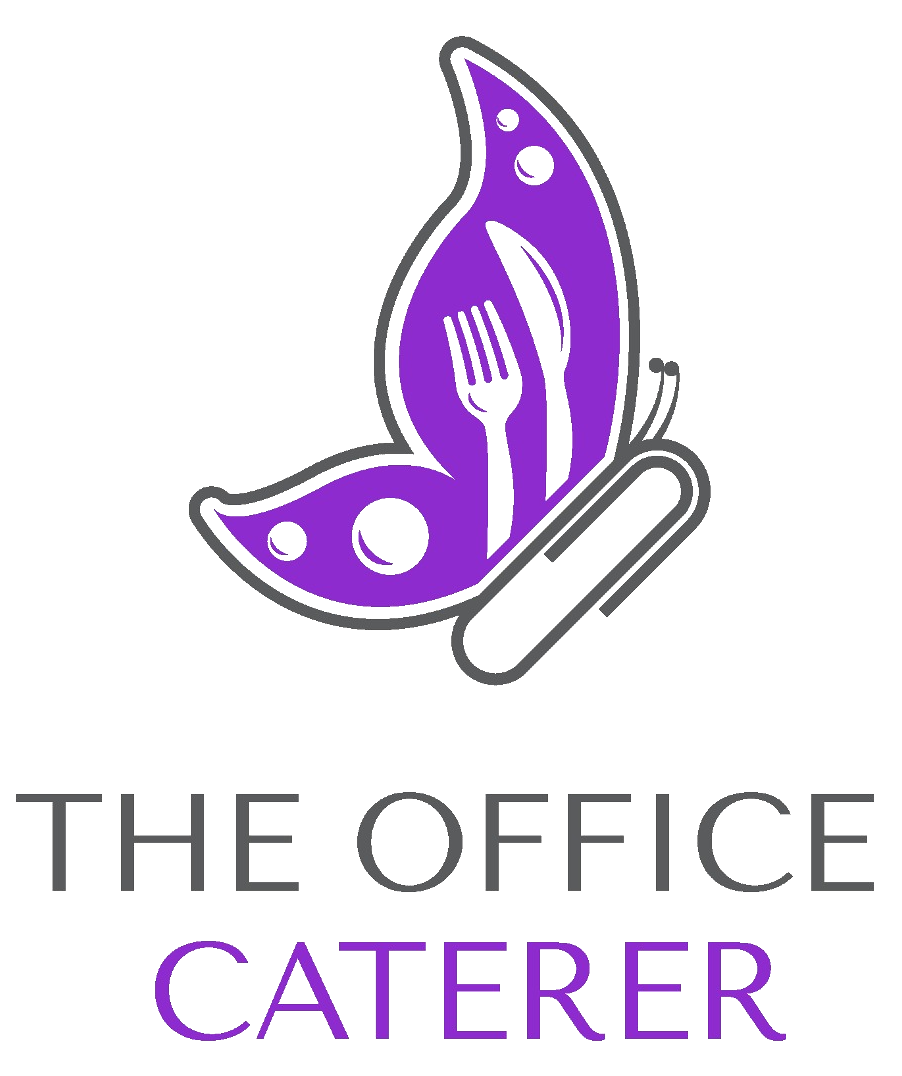Corporate catering involves providing professionally prepared meals and refreshments for businesses, their employees, clients, or event attendees. Offering catered meals and snacks in an office setting has numerous benefits. It fosters a sense of community and appreciation among employees, enhancing workplace culture and morale. Additionally, catered meals boost productivity by eliminating the need for employees to leave the premises during lunchtime, allowing for efficient use of break periods.
Corporate catering services also enable companies to provide high-quality dining experiences for client meetings, conferences, or special events, leaving a positive impression on attendees. Typical corporate catering menu offerings span a wide range, including breakfast fare, lunch options, dinner menus, and hors d’oeuvres for evening events or receptions. Menus often cater to diverse dietary preferences and restrictions, ensuring inclusivity for all attendees. Learn more in this blog by The Office Caterer.
Contents
- 1 Factors to Consider When Planning a Corporate Menu
- 2 Breakfast Menu Ideas
- 3 Lunch Menu Choices
- 4 Dinner and Evening Event Menus
- 5 Beverage Service
- 6 Sustainable and Locally-Sourced Options
- 7 Branding and Customization Opportunities
- 8 Setting and Staffing Catering Events
- 9 Budgeting for Catered Office Events
- 10 Ordering and Logistics
- 11 FAQ
- 12 Conclusion
Factors to Consider When Planning a Corporate Menu
When planning a corporate catering menu, several key factors must be considered to ensure a successful event that meets the needs and preferences of all attendees.
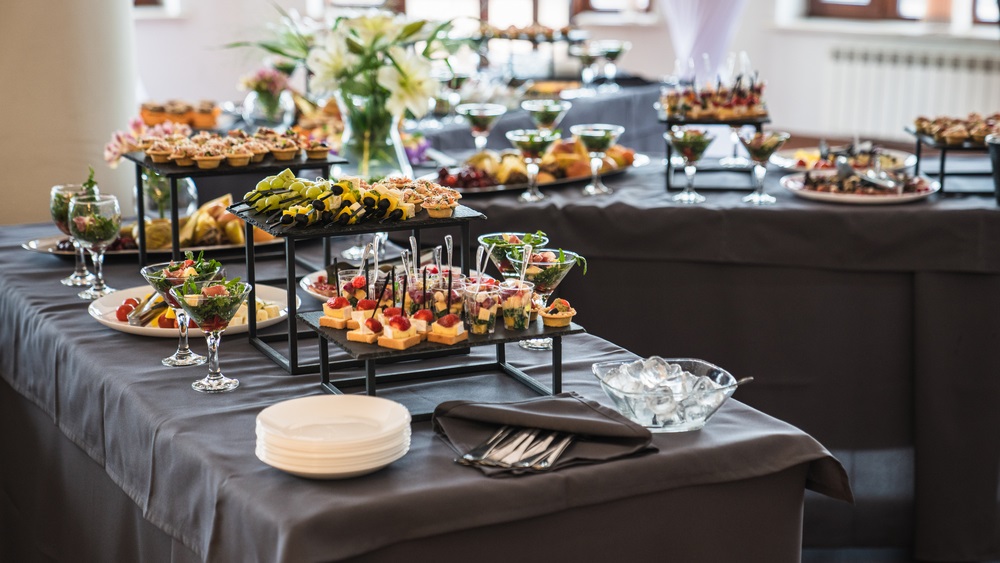
Dietary Restrictions
Accommodate vegetarian, vegan, gluten-free, or nut allergies to cater to diverse dietary requirements. Respect cultural preferences and traditions, especially in multicultural corporate environments, by offering menu items that resonate with various backgrounds.
Budget Constraints
Catering costs can quickly increase, especially for larger events. It’s crucial to balance providing a satisfying and memorable dining experience while staying within the allocated budget.
Number of Attendees
This determines the quantity of food and beverages required and the logistical arrangements for seating and serving.
Time of Day
Breakfast events may require a selection of pastries, fruits, and hot items, while lunch and dinner events may call for more substantial entrees, sides, and desserts. The event’s formality should also be considered.
Breakfast Menu Ideas
Offering a variety of popular items is key to accommodating different dietary needs and preferences for corporate breakfast events.
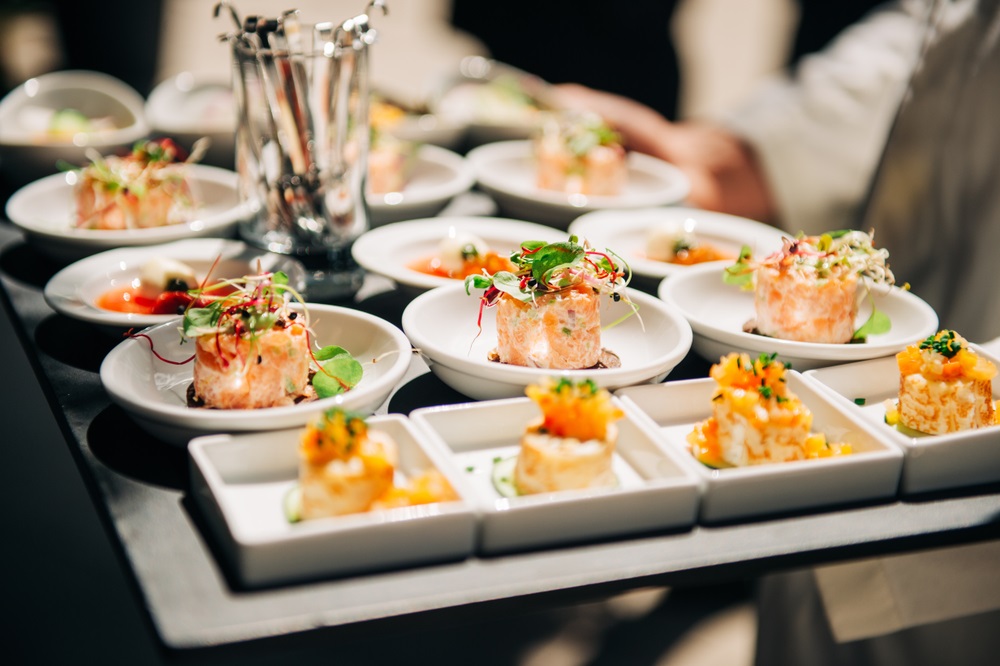
Classic breakfast sandwiches, fresh pastries, and yogurt parfaits are crowd-pleasers. Include healthy options like fresh fruit, oatmeal, and egg white frittatas. Regional specialties like breakfast tacos or lox and bagels can add local flair. Remember portable grab-and-go items like granola bars and fresh-squeezed juices for those rushing to meetings.
Lunch Menu Choices
Lunch is often the main meal during corporate events and meetings, so offering various satisfying options is important.
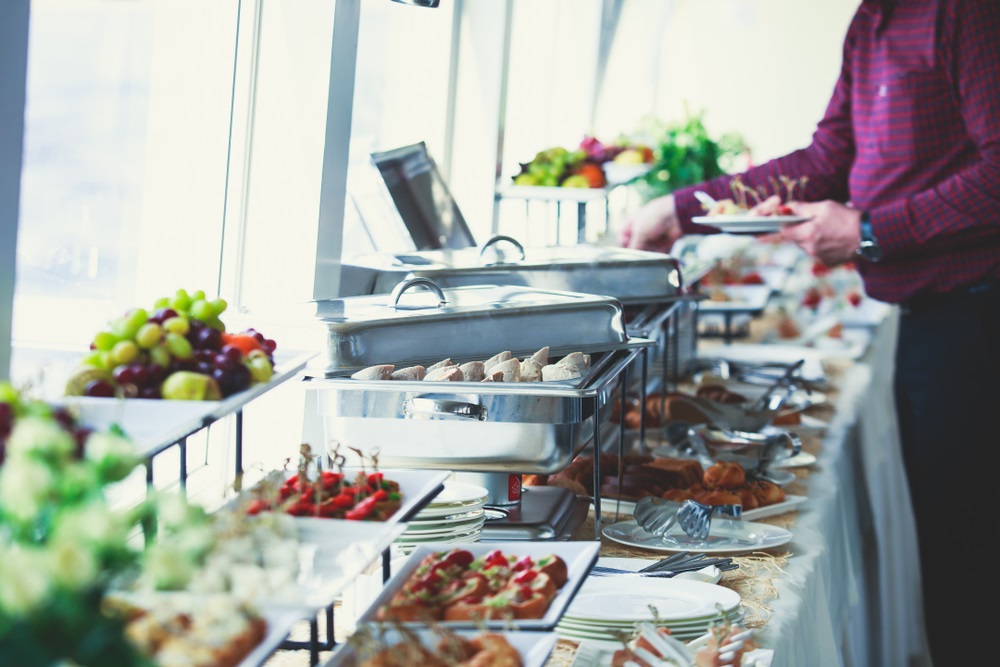
Sandwich platters are a classic choice, allowing for customization with different bread types, proteins like turkey and roast beef, vegetarian options, and an array of toppings and condiments. Salad varieties like mixed greens, Caesar, and grain-based salads provide lighter and healthier alternatives. Hot entree options like pasta dishes, chicken or beef entrees, and vegetarian options like stuffed portobello mushrooms or vegetable lasagna cater to diverse dietary needs. Sides like roasted potatoes, steamed veggies, and rice pilaf round out the meal, while accompaniments like freshly baked rolls or artisan bread add variety.
Dinner and Evening Event Menus
For corporate evening events, the menu choices can range from seated multi-course meals to lively buffet stations or passed hors d’oeuvres for cocktail parties.
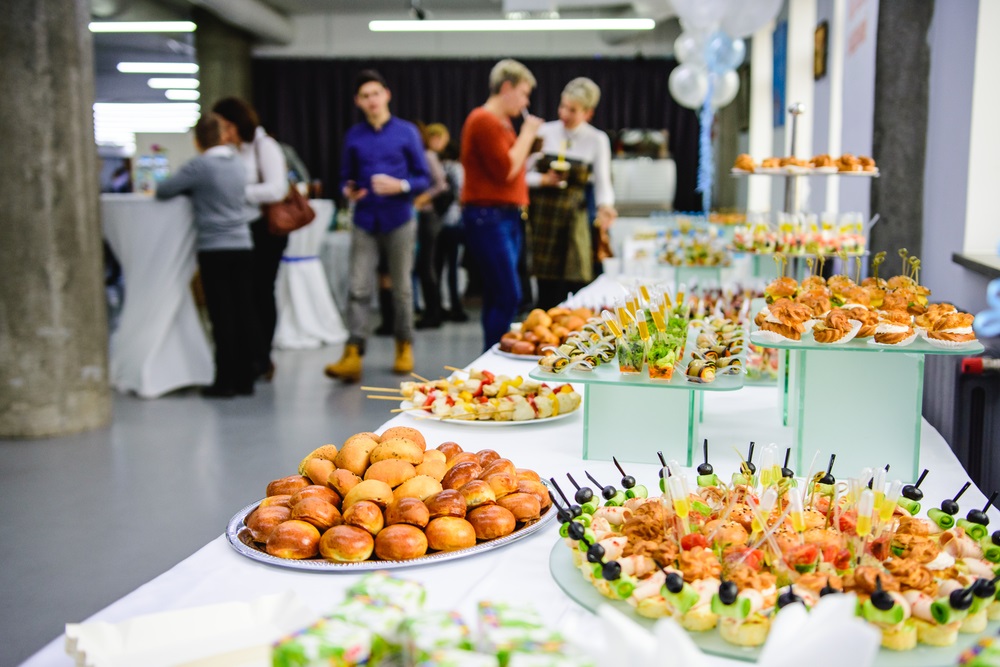
A seated dinner allows for a more formal, structured dining experience with multiple courses carefully plated and served. This format suits galas, award ceremonies, or important client dinners. The menu might start with an amuse-bouche or soup course, followed by a salad, palate cleanser, choice of protein-focused entrees, and decadent desserts. Wine pairings add an extra level of sophistication.
Buffet stations offer more flexibility and variety, allowing guests to customize their plates while mingling. Stations can feature themed cuisine like Italian, Mexican, or Mediterranean fare. Be sure to cater to dietary restrictions with vegan, gluten-free, and allergy-friendly sections.
For stand-up cocktail receptions, small bites and finger foods are ideal. Caterers can get creative with bite-sized delicacies like mini crab cakes, beef wellingtons, vegetable rolls, bruschetta, skewers, and more. Include a mix of hot and cold passed hors d’oeuvres for variety. Don’t forget shareable stationary items like cheese and charcuterie spreads or dips with crudités. Dessert stations or passed sweets provide a sweet finish. Bite-sized treats like cake pops, petit fours, mini tarts, and chocolate truffles satisfy cravings. An elegant dessert bar with make-your-own sundaes, bananas foster, and coffee drinks is a decadent way to end the evening.
Beverage Service
Corporate catering menus often include beverage packages to complement the food offerings. Coffee and tea service are essential for morning meetings and events, providing an energizing start to the day. High-quality coffee, an assortment of tea varieties, and appropriate condiments like cream, sugar, and lemon wedges should be available.
Soft drink selections are popular for luncheons and afternoon affairs. Offering bottled water, sodas, juices, and sparkling waters ensures guests can quench their thirst. Customized drink menus featuring refreshing lemonades, fruit-infused waters, or specialty beverages like smoothies add a touch of sophistication.
Evening events and receptions frequently call for alcoholic beverage packages. Beer and wine are standard, but craft cocktails, a limited full bar, or signature-themed drinks create a more festive atmosphere. Non-alcoholic mixers should also be provided for those abstaining. Experienced bartenders and proper licensing are essential for serving alcohol responsibly. Thoughtful beverage offerings enhance the catering experience and keep guests hydrated and satisfied throughout events of any duration.
Sustainable and Locally-Sourced Options
In today’s environmentally conscious business landscape, many companies seek catering menus prioritizing sustainability and locally sourced ingredients.
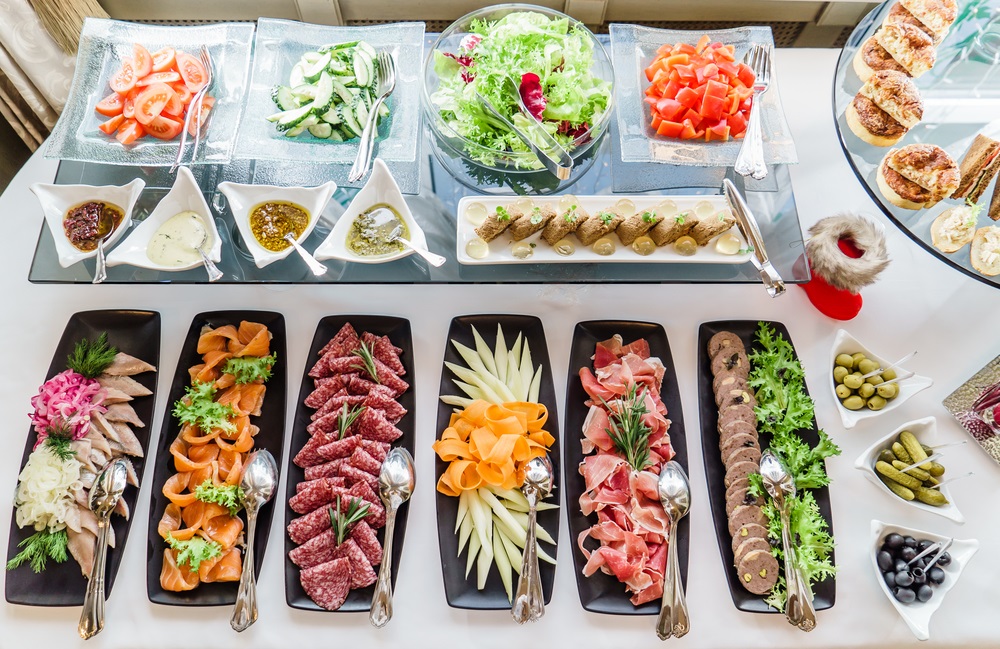
Farm-to-table cuisine has become increasingly popular as it supports local agriculture, reduces carbon emissions from long-distance transportation, and provides fresher, more nutrient-dense foods.
Vegetarian and vegan menu options are also key considerations for sustainable corporate catering. Plant-based dishes generally have a smaller environmental footprint than meat and dairy products, as they require fewer resources. Moreover, offering various vegetarian and vegan choices caters to the diverse dietary needs and preferences of employees and guests.
Supporting local businesses is another aspect of sustainable catering. By partnering with nearby farms, bakeries, and food vendors, companies can contribute to their local economies while minimizing the environmental impact of transporting goods over long distances. Many caterers now prioritize sourcing ingredients from within a certain radius, ensuring that the food is fresh and has a lower carbon footprint.
Beyond the menu, sustainable catering practices can extend to compostable or recyclable packaging, minimizing food waste, and providing reusable dishware and utensils. These measures reduce the environmental impact of catered events, align with corporate social responsibility initiatives, and demonstrate a commitment to sustainability.
Branding and Customization Opportunities
Corporate catering events present a valuable opportunity to reinforce your company’s brand identity and image. From customized menu cards and packaging to branded decor elements and napkins, there are numerous ways to incorporate your brand into the catering experience.
Branded packaging, such as boxes or bags featuring your company logo, can make a lasting impression on attendees and be a subtle yet effective marketing tool. Custom menu cards allow you to showcase your brand while communicating the meal options to guests.
Incorporating branded decor elements like tablecloths, napkins, or custom-printed cocktail napkins can create a cohesive and memorable branded experience. These small touches can go a long way in reinforcing your brand identity and leaving a positive impression on clients, employees, or potential partners.
Many catering companies offer customization services, allowing you to work directly with them to create branded packaging, menus, and decor tailored to your needs. This level of personalization can elevate the overall catering experience and ensure a seamless alignment with your brand’s image and messaging.
Setting and Staffing Catering Events
One of the most critical aspects of planning a successful corporate catering event is setting up the space and ensuring adequate staffing.
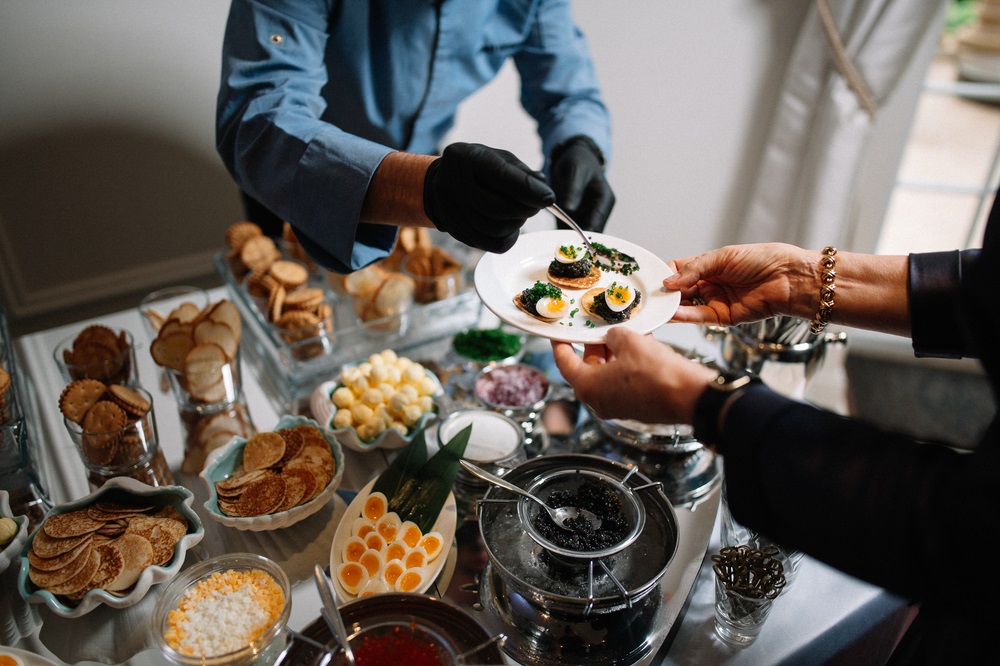
When it comes to room setup, consider the layout, flow of traffic, and the number of guests expected. Arrange tables and chairs to promote comfortable mingling and easy access to food stations or buffet lines.
In addition to the seating arrangement, you’ll need to consider rental equipment such as linens, china, glassware, and flatware. Many catering companies can provide these items, but depending on your event’s theme and formality, you may also need to rent them separately.
Staffing is another crucial factor to consider. Professional servers can ensure smooth service, replenish food and beverages, and maintain a tidy environment throughout the event. The number of servers required will depend on the size of your guest list and the complexity of the menu.
For more elaborate events, you may consider having on-site chefs prepare and plate dishes in front of your guests. This adds a touch of elegance and ensures that food is served at its peak freshness and quality.
When working with caterers, discuss their staffing options and any additional costs associated with servers, chefs, or other personnel. It’s also essential to clarify their responsibilities and ensure they understand your event’s specific needs and expectations.
Budgeting for Catered Office Events
Budgeting is a crucial consideration when planning a corporate catering event. Typical per-person costs can range from $10 to $50 or more, depending on the menu selections, service level, and location. While cutting costs by opting for basic fare may be tempting, splurging on higher-quality meals can leave a lasting impression and contribute to employee satisfaction and morale.
When setting a catering budget, account for the food and any applicable tax and service fees, which can add 20-25% to the total cost. Delivery charges, if applicable, should also be factored in, as these can vary based on the distance and complexity of the order.
To manage costs, consider strategies such as:
- Offering a mix of affordable and premium menu options
- Negotiating package deals or volume discounts with caterers
- Selecting menu items that are in season and locally sourced
- Limiting high-cost items like proteins or desserts
- Providing simple self-serve beverage stations rather than full bar service
Striking the right balance between cost and quality is key. While staying within budget is essential, investing in a memorable and enjoyable catering experience can pay dividends in employee engagement and productivity.
Ordering and Logistics
Proper planning and coordination are essential for a seamless event when ordering corporate catering.
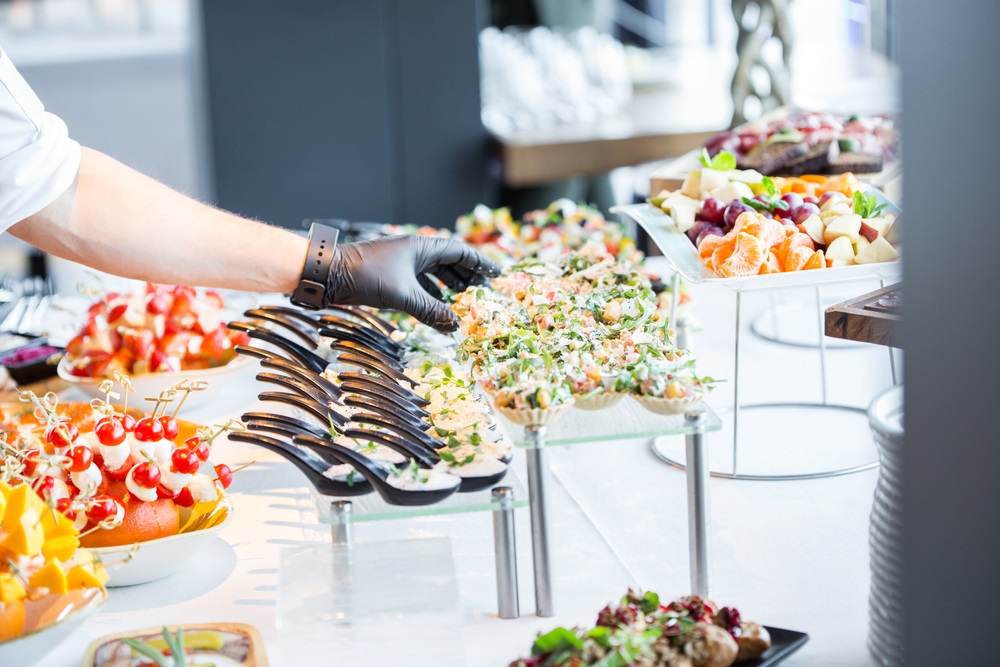
Lead times for placing orders can vary depending on the caterer and the complexity of the menu. Still, placing orders at least a week in advance for standard catering requests is generally recommended. A lead time of two to four weeks may be necessary for larger events or more elaborate menus.
Payment methods accepted by caterers can differ, but most will accept credit card payments, corporate checks, or direct bank transfers. Some may require a deposit or full payment upfront, while others may allow payment upon delivery or after the event. Clarifying payment terms and methods with the caterer during the initial booking process is crucial.
Flexibility is key when it comes to order changes or cancellations. Most caterers will have a cut-off date for making changes or canceling orders without incurring additional fees. This timeline can range from a few days to a week or more before the event date. Communicating any changes or cancellations promptly is essential to avoid unnecessary charges.
Delivery windows are another crucial aspect to consider. Caterers typically provide a delivery window, often 30 minutes to an hour, during which they will arrive at the specified location. Designated personnel must be available to receive the delivery and ensure proper setup and temperature control for the catered items. Some caterers may offer on-site service, where their staff will set up, serve, and clean up after the event for an additional fee.
FAQ
You asked, we answered:
What Are The Most Popular Corporate Catering Menu Items?
The most popular menu items for corporate catering often include finger foods, sandwiches, wraps, salads, and assorted desserts that can easily be shared and enjoyed during meetings or office events.
How Can We Accommodate Dietary Restrictions With Corporate Catering?
When organizing catering, it’s important to offer a variety of options including vegetarian, vegan, gluten-free, and nut-free choices to ensure that all dietary needs and preferences are accounted for.
What Are Some Healthy Catering Options For The Office?
Healthy catering options include fresh fruit platters, vegetable trays with hummus, grilled chicken salads, whole grain wraps, and sushi rolls. These choices cater to those looking for lighter, nutritious meals.
How Much Should We Budget For Office Catering?
The budget for office catering can vary greatly depending on the number of people, the type of food, and the service provider. It’s best to get quotes from several caterers and discuss menu options within your budget.
Conclusion
A well-planned and diverse corporate catering program is essential for fostering a positive workplace culture, boosting employee morale, and creating a favorable impression on clients and guests. By offering a variety of delicious and visually appealing menu options that cater to different dietary needs and preferences, companies can demonstrate their commitment to inclusivity and employee well-being.
Moreover, partnering with reputable and innovative catering providers can elevate the dining experience, promoting networking opportunities and facilitating productive meetings and events. A thoughtfully curated corporate catering program nourishes the workforce and serves as a powerful branding tool, reflecting the company’s values and attention to detail.
Ultimately, investing in a diverse and appealing corporate catering program is a strategic decision that can contribute to a positive work environment, foster collaboration, and leave a lasting impression on all stakeholders involved. Contact The Office Caterer to schedule your breakfast and lunch catering.
